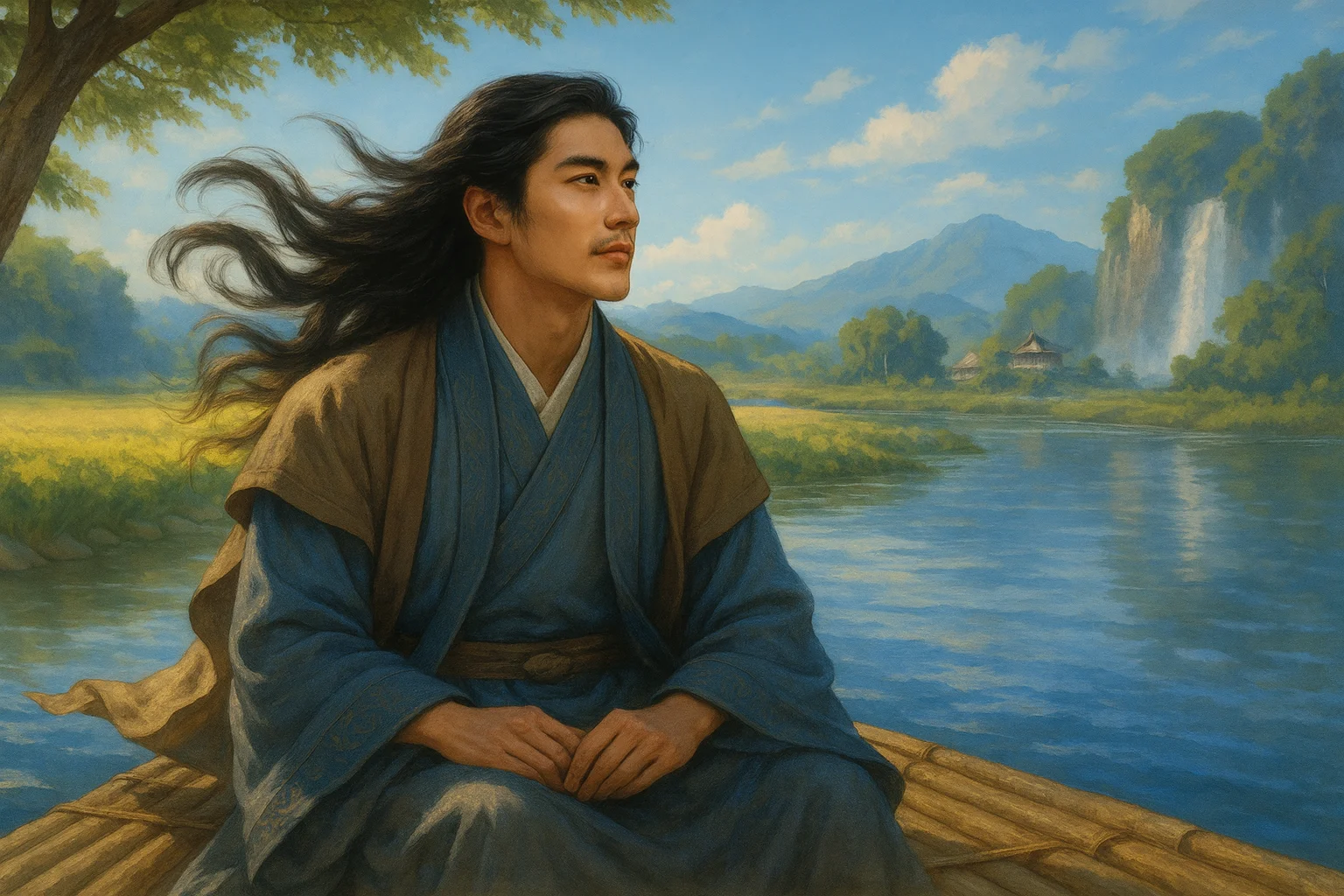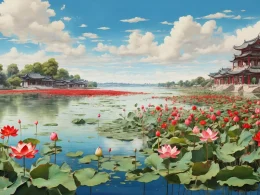When the Emperor sought guidance from wise men, from exiles,
He found no calmer w i sdom than that of young Chia
And assigned him the foremost council-seat at midnight,
Yet asked him about gods, instead of about people.
Original Poem
「宿桐庐江寄广陵旧游」
孟浩然
山暝听猿愁, 沧江急夜流。
风鸣两岸叶, 月照一孤舟。
建德非吾土, 维扬忆旧游。
还将两行泪, 遥寄海西头。
Interpretation
Written during Meng Haoran's travels through Wu-Yue after leaving Chang'an, this poem captures a night of solitary mooring on the Tonglu River. The quiet river landscape mirrors the poet's profound nostalgia for past travels in Yangzhou (Weiyang) and departed friends, exemplifying his signature style of expressing solitude through natural imagery.
First Couplet: "山暝听猿愁,沧江急夜流。"
Shān míng tīng yuán chóu, cāng jiāng jí yè liú.
Mountains darken - plaintive ape cries; The blue river races through night.
The opening establishes a melancholic soundscape where the apes' mournful calls merge with the river's urgent flow, externalizing the poet's inner restlessness.
Second Couplet: "风鸣两岸叶,月照一孤舟。"
Fēng míng liǎng àn yè, yuè zhào yī gū zhōu.
Wind hums through leaves on both banks; Moonlight bathes my lone boat.
This couplet paints an ink-wash landscape of sound and light - rustling leaves and luminous solitude creating an atmosphere of exquisite loneliness.
Third Couplet: "建德非吾土,维扬忆旧游。"
Jiàndé fēi wú tǔ, wéiyáng yì jiù yóu.
Jiande is not my native soil; My heart dwells on Yangzhou travels.
The shift from scenery to memory marks the emotional turning point, contrasting present displacement with cherished recollections.
Fourth Couplet: "还将两行泪,遥寄海西头。"
Hái jiāng liǎng háng lèi, yáo jì hǎi xī tóu.
These twin trails of tears I'll send Westward across the sea.
The conclusion materializes emotion through physical tears, transforming grief into a tangible offering to distant friends.
Holistic Appreciation
The poem progresses through four perceptual layers: auditory (ape cries, rushing water, rustling leaves), visual (moonlit boat), geographical (foreign shore versus remembered homeland), and finally tactile (tears on the face). This sensory journey mirrors the psychological movement from present isolation to emotional connection across distance. The moon, a silent witness in the second couplet, becomes an implied messenger carrying the poet's tears westward in the final lines.
Artistic Merits
- Symphonic composition: Orchestrates natural sounds into emotional music
- Dimensional contrast: Juxtaposes vertical mountainscape with horizontal river flow
- Emotional alchemy: Transforms water imagery from river current to human tears
- Cultural resonance: "Westward across the sea" evokes classical poetic traditions of distant longing
Insights
This nocturnal meditation reveals how geographical displacement intensifies emotional memory. Meng demonstrates that true connection transcends physical presence when distilled through artistic expression - his tears become more than personal grief, transforming into shared human currency. The poem suggests our deepest nostalgias often surface in nature's quiet moments, and that articulating loneliness through art can paradoxically bridge the very distances it mourns.
Poem translator
Kiang Kanghu
About the poet

Meng Haoran (孟浩然), 689 - 740 AD, a native of Xiangyang, Hubei, was a famous poet of the Sheng Tang Dynasty. With the exception of one trip to the north when he was in his forties, when he was seeking fame in Chang'an and Luoyang, he spent most of his life in seclusion in his hometown of Lumenshan or roaming around.












